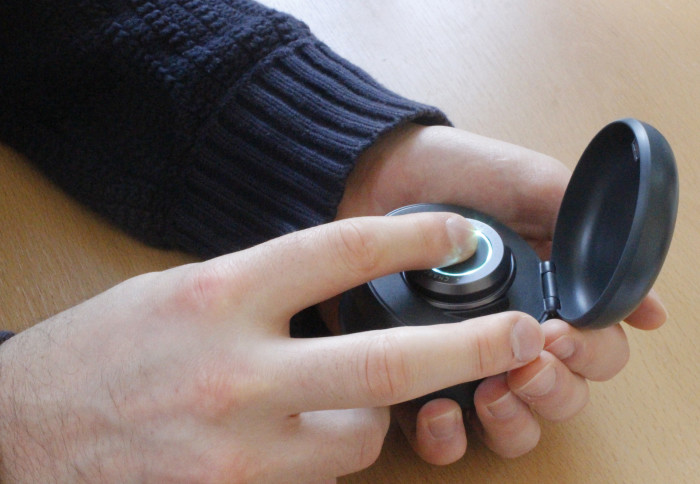Imperial startup joins forces with QMUL on medtech to help Parkinson's sufferers

Charco Neurotech, founded at Imperial, will work with Queen Mary University of London, to test its device for alleviating the symptoms of Parkinson’s.
The medical technology startup’s innovative device, named CUE1, is designed to be worn on the chest and delivers vibrations that early research suggests may help reduce several symptoms of Parkinson’s disease, an incurable brain disorder that causes difficulties with movement.
Current treatments for the symptoms of Parkinson’s, the world’s fastest growing neurodegenerative condition, are often based around drugs that can have side effects and whose efficacy can wane over time. CUE1 could provide a non-pharmaceutical complement to these existing treatments.
The non-invasive wearable device works by delivering localised vibrations to the chest that in turn send signals to the nervous system which pre-clinical research suggests could help to reduce symptoms such as slowness, stiffness and problems with balance.
Entrepreneurial journey

Charco Neurotech was founded in 2019 by Lucy Jung, then a student on Imperial’s master’s programme in Innovation Design Engineering, and physician Dr Floyd Pierres, who were inspired by the work of the 19th century neurologist Jean-Martin Charcot.
With support from entrepreneurship programmes at Imperial and an early seed investment by the Imperial College Enterprise Fund, the company went on to receive $10 million investment in a round led by Amadeus Capital Partners and Parkwalk Advisors that was reportedly the 2021 largest seed round in Europe for a health technology device.
A new academic collaboration
The team will now work with academics at QMUL on research as part of a Knowledge Transfer Partnership (KTP), a programme by Innovate UK which offers companies substantial funding to access academic expertise from universities such as QMUL, Imperial, and others across the UK.
Charco and QMUL are now searching for a KTP Associate, a talented graduate who will spend time divided between the company and university leading a project to further test the device, optimise its settings and body positioning, and design a formal clinical trial.
Lucy Jung, CEO and co-founder of Charco, said: “We could not be more happy to be working together with QMUL on this project. Working with such an institution and leaders in the world of Parkinson's will be instrumental and invaluable in translating research and development to support this intervention. This will help us to improve the quality of life for people with Parkinson's.”
QMUL knowledge base lead, Dr Alastair Noyce, Consultant Neurologist and Clinical Reader in the Wolfson Institute of Population Health said: “We are very excited to have the opportunity to partner with Charco Neurotech and investigate the role that the CUE1 device has in treating challenging symptoms of Parkinson’s. We know that it is beautifully designed and has yielded benefits for some patients, but now it is time to investigate just how much it can offer to a wider group with Parkinson’s.”
Article text (excluding photos or graphics) © Imperial College London.
Photos and graphics subject to third party copyright used with permission or © Imperial College London.
Reporter
David Silverman
Communications Division